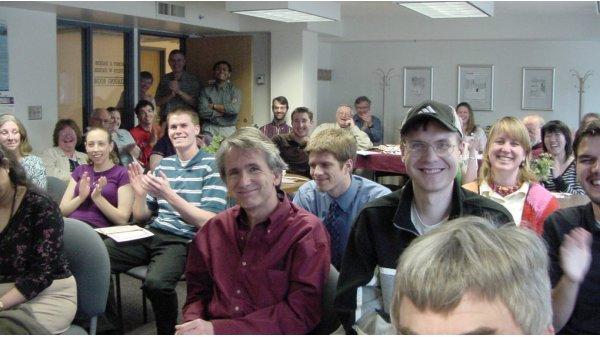No tests, quizzes, exams and no homework
Posted by: Gary Ernest Davis on: January 25, 2010
Yes, that’s right: this semester all 3 mathematics courses I am teaching are devoid of tests, quizzes, examinations and homework.  The courses are:
The courses are:
- Ordinary differential equations (37 students)
- Mathematical statistics (12 students)
- Mathematical modeling of cellular networks (22 students)
The differential equations class consists entirely of undergraduate engineering students. Â This class is structured into two quarters, each of 7 weeks. In each quarter students will work in groups on two substantial projects in differential equations.
The topic for the first project for the first quarter is Newton’s law of cooling and its (mis)application to estimating time of death. Apart from the law of cooling with constant ambient temperature, students will investigate what happens if the ambient temperature varies linearly – say over early morning to early afternoon – and cyclically, as it might over several days.
The second project for the first quarter is numerical approximation of solutions of non-linear systems of differential equations, using increasingly sophisticated numerical schemes – Euler’s method, modified Euler, order Runge-Kutta, and use of MATLAB ODE solvers.
Students will work in groups of 4 to prepare two poster presentations for the break in week eight. Each student will keep a WordPress blog where they will write up individual accounts of their project work. WordPress is useful for this purpose because it has a full implementation of AMS LaTeX.
The mathematical statistics class is a mix of mathematics majors, computer science students and engineering majors. In this class students work on core applied projects from the outstanding book StatLabs by Deborah Nolan and Terry Speed. This is a book designed to teach mathematics majors how to apply mathematical statistics and learn to become mathematical scientists.
The  mathematical modeling of cellular networks course has an eclectic mix of students ranging from a Ph.D. student in electrical engineering to a high school senior enrolled as a non-degree undergraduate.
The book is a research-based text, written for graduate students, on recent advances in modeling protein-protein interactions in cellular networks.
Students in this course will learn to think like scientists – to have ideas, to test them, to be honest in reporting, and to have respect for other’s opinions and ideas. They will also learn that learning outside of the usual protected, managed classroom environment is generally messy, with many false starts.
Testing is crap, so far as I am concerned. I can devise a test so that all students pass well, all students fail miserably, and all shades in between, so that only a very careful expert could tell how I manipulated the outcome. Simply changing the order of questions can dramatically affect student test scores.
I am no longer interested in the  post WWII obsession with testing and checking, as if students were being assigned to an army corps.
I am vitally interested in students who, at the prime of their intellectual lives, are deeply interested in science and mathematics, and who want to make a difference, in the world.
I am interested in the students who are scarred by colleagues who set absurd and arcane tests – students who are wounded and deserve a chance to show how they can shine.
I don’t want my students sweating over grubby tests.
I want them to shine, to catch fire, to become impassioned and to want to make their mark on the world – to make a difference.
6 Responses to "No tests, quizzes, exams and no homework"
I wish I had a teacher like you. It’s hard to find one that actually cares about its students.
Thanks for your great articles !
Your class almost make me wish I were back in college ;). Seriously, I applaud your focus on project work. Do you also do away with grades?
You make teaching sound like polishing diamonds :-)
Some teachers make the difference that really counts.
Hi,
I am a Ph.D. student in the Mathematics and Science Education Department at the University of GA-Athens.
I am getting ready to start work on my dissertation and am looking for participants. I am interested in teachers’ perspectives on teaching, learning and homework for teachers who teach mathematics without homework. I ran across your blog and am interested in making closer contact with you about my research interests. If you are interested or know of someone who also fits the criteria, please contact me so we may talk.
Thanks,
Tonya C. Brooks
UGA Mathematics and Science Education
I tried this (more or less) one summer teaching a Calculus II class (Integration). I did give some homework, and the “final” was an oral examination where each student simply discussed various problems and demonstrated the ability to think about and apply the material.
The grading on my part was entirely subjective (though well documented) but, as you pointed out, grades can be manipulated even when there is an appearance of objectivity.
From my point of view, this experiment was an amazing success. Students who never would have learned the material otherwise excelled in this format, and whereas the students initially thought: “yay! no tests or homework”, they learned quickly to their chagrin that this format required just as much if not more of their time as a more standard one.
It did turn out that some of the typically “A” students didn’t do as well as they would have liked, and in one case I found myself defending a grade to the father of a student. I think this probably can be attributed to a sort of culture shock. Most students couldn’t believe that I could actually “get away” with what I was doing since it was so non-standard. I do believe that it could only be a good thing if such an approach was the norm, but I don’t think we currently have the manpower to implement this across the board for all students and all subjects. Certainly my wife complained frequently that Summer that I was spending all my free time devoted to teaching those students.
Anyway, just thought I’d share my experience.
John



January 26, 2010 at 2:16 am
I am so with you on this one. I have diminished my homework to seven problems 3 nights a week, but have always envisioned a school year without homework. No tests, I like this too. Come to school and just explore and free your mind, I like it. Kudos!